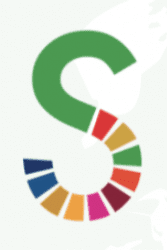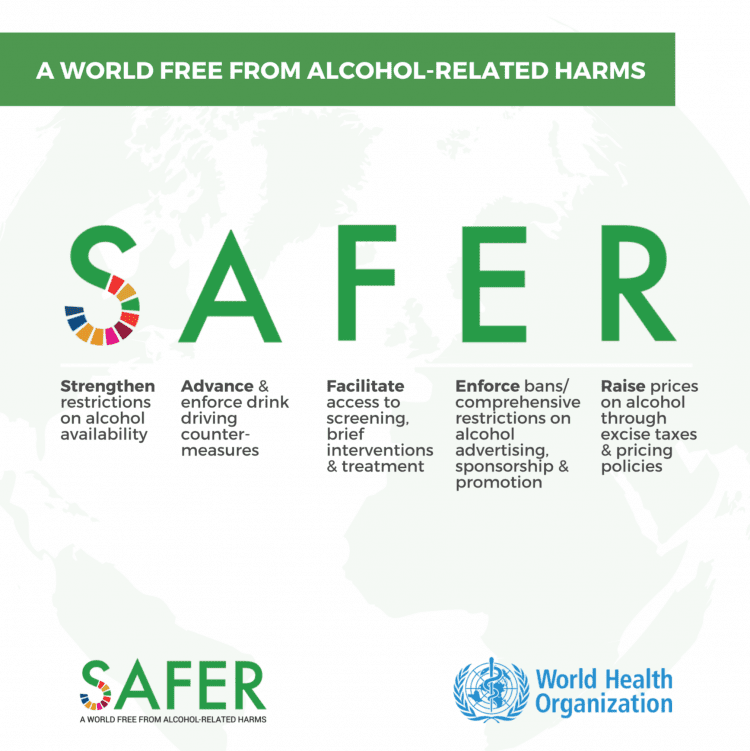New SAFER Initiative Launched At United Nations
WHO Launches SAFER Alcohol Control Initiative To Curb Alcohol Harm
WHO-led initiative and action package aim to support global target of reducing harmful use of alcohol by 10% by 2025.
The World Health Organization (WHO) has launched a groundbreaking new initiative and technical package called SAFER – outlining five high-impact strategies that can help governments prevent and reduce alcohol harm and related health, social and economic consequences.
- Strengthen restrictions on alcohol availability.
- Advance and enforce drink driving countermeasures.
- Facilitate access to screening, brief interventions, and treatment.
- Enforce bans or comprehensive restrictions on alcohol advertising, sponsorship, and promotion.
- Raise prices on alcohol through excise taxes and pricing policies.
New support for governments
SAFER is the newest WHO-led roadmap to support governments in taking cost-effective steps to accelerate progress on healt, social justice and sustainable development through addressing alcohol harm.
We are proud to introduce SAFER – a package of proven interventions to reduce the harms caused by alcohol, and a new partnership to catalyze global action,” said Dr Tedros Adhanom Ghebreyesus, Director-General of the World Health Organization.
We need governments to put in place effective alcohol control policy options and public policies to reduce the harmful use of alcohol.”
Alcohol consumption contributes to more than 3 million deaths globally every year and over 5% of the global burden of disease and injury, according to the recently issued WHO Global Status Report (GSR) on Alcohol and Health 2018. It is also a major risk factor for NCDs, including cancers and cardiovascular diseases, communicable diseases such as TB and HIV/AIDS, violence, and injuries. Globally, alcohol consumption is the seventh leading risk factor for premature death and disability.
Strong IOGT support
Multiple partners, from governments to civil society organizations, have lent their support to the new SAFER initiative. IOGT International has played a key role in lending support to the development of the new technical package and initiative, SAFER.
Kristina Sperkova, International President of IOGT International, the premier global social movement for alcohol prevention and control, said:
In communities and societies around the world, we see an urgent need for action to prevent and reduce alcohol harm. Investing in the alcohol policy best buys as packaged in SAFER is scientifically sound and economically smart, generating considerable returns on investment.”
High-impact strategies
Following the successful example of MPOWER for tobacco control and other WHO technical packages suchas SHAKE, SAVE LIVES, and HEARTS, SAFER provides action-oriented guidance for country-level implementation with a small number of high-impact interventions.
While SAFER will benefit all countries, country-level operations will focus on low- and middle-income countries, especially those with a high burden of alcohol harm.
The technical package, operational programme and communication and advocacy campaign will focus on the five WHO “best buys” for preventing and reducing alcohol harm:
Strengthen restrictions on a lcohol availability
lcohol availability
Enacting and enforcing restrictions on commercial or public availability of alcohol through laws, policies, and programmes are important ways to reduce harmful use of alcohol. Such strategies provide essential measures to prevent easy access to alcohol by young people and other vulnerable and high-risk groups.
 Advance and enforce drink driving counter measures
Advance and enforce drink driving counter measures
Road users who are impaired by alcohol have a significantly higher risk of being involved in a crash. Enacting and enforcing strong drink-driving laws and low blood alcohol concentration limits via sobriety checkpoints and random breath testing will help to turn the tide.
 Facilitate access to screening, brief interventions and treatment
Facilitate access to screening, brief interventions and treatment
Health professionals have an important role in helping people to reduce or stop their alcohol use to reduce health risks, and health services have to provide effective interventions for those in need of help and their families.
 Enforce bans or comprehensive restrictions on alcohol advertising, sponsorship, and promotion
Enforce bans or comprehensive restrictions on alcohol advertising, sponsorship, and promotion
Bans and comprehensive restrictions on alcohol advertising, sponsorship and promotion are impactful and cost-effective measures. Enacting and enforcing bans or comprehensive restrictions on exposure to them in the digital world will bring public health benefits and help protect children, adolescents and abstainers from the pressure to start consuming alcohol.
 Raise prices on alcohol through excise taxes and pricing policies
Raise prices on alcohol through excise taxes and pricing policies
Alcohol taxation and pricing policies are among the most effective and cost-effective alcohol control measures. An increase in excise taxes on alcoholic beverages is a proven measure to reduce harmful use of alcohol and it provides governments revenue to offset the economic costs of harmful use of alcohol.
The three key principles
Three key principles will drive the SAFER initiative forward: implement, monitor, and protect.
- Advocacy, resource mobilization, technical capacity building and programmatic action at country level are key components in the implementation of SAFER.
- SAFER implementation must be supported by strong monitoring systems, to enable accountability and progress tracking. Such systems, at the country level, should include monitoring of sales, consumption, health and social harms, economic impact, and industry practices. WHO will incorporate SAFER monitoring into its global monitoring and surveillance system.
- SAFER will support countries by ensuring that alcohol control measures are guided, formulated and implemented by public health interests and as such are protected from industry interference and commercial interests.
Download key documents
The SAFER social media messages (PDF)
The SAFER flyer (PDF)
The SAFER background document (PDF)
The SAFER framework (PDF)

